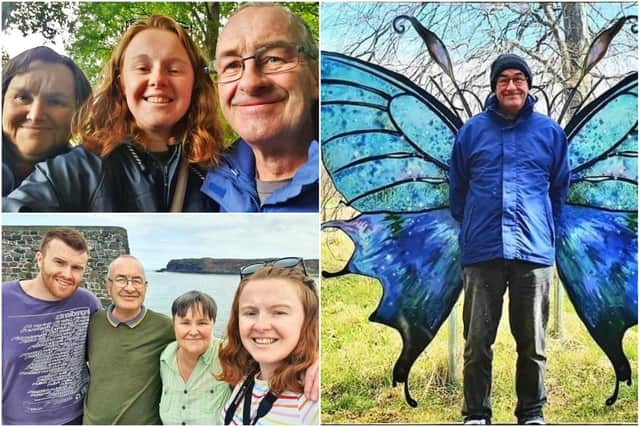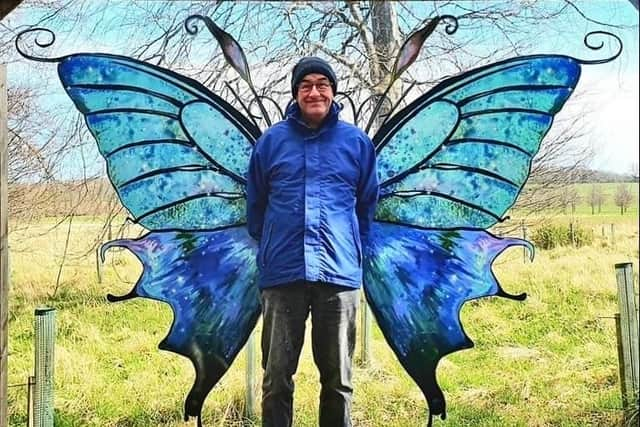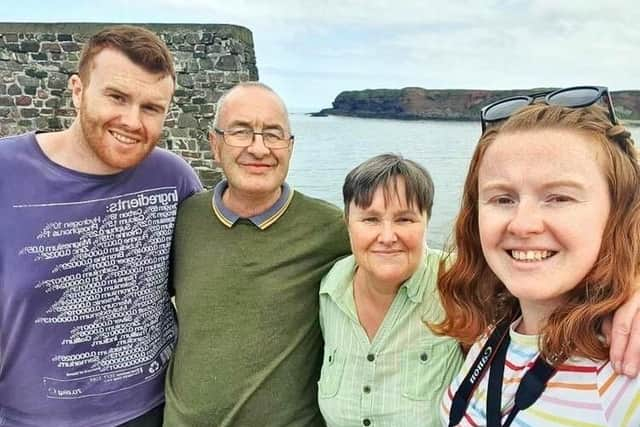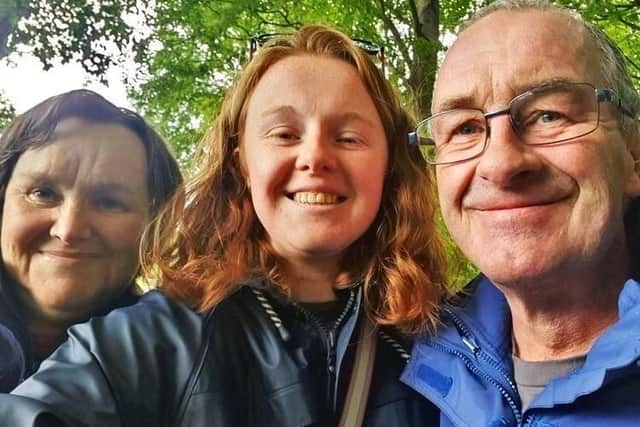Oesophageal Cancer Awareness Month: dad’s acid reflux turned out to be ‘debilitating’ cancer
This article contains affiliate links. We may earn a small commission on items purchased through this article, but that does not affect our editorial judgement.
and live on Freeview channel 276
When Douglas Findlay went to the doctor after experiencing issues at mealtimes it was thought he had acid reflux - however it turned out to be oesophageal cancer.
Sadly Douglas, 63, lost his battle with cancer on 22 July last year, however his family have been trying to raise awareness of the disease which is often diagnosed at a late stage and can be difficult to treat.
Advertisement
Hide AdAdvertisement
Hide AdCancer of the oesophagus has the effect of narrowing the oesophagus, also known as the gullet, and causing difficulty in swallowing. It may also spread to form secondary tumours.
The signs of oesophageal cancer, which includes persistent heartburn and indigestion, can be hard to spot and some people have none before experiencing problems with swallowing.


As part of Oesophageal Cancer Awareness Month, Douglas’s daughter Laura has spoken about the impact the cancer had on her dad and the family.
Douglas, who was an artist, was diagnosed in June 2020 - however by that time he had been experiencing issues for a while.
Advertisement
Hide AdAdvertisement
Hide AdLaura, 26, said her dad had problems with indigestion and was having difficulty eating, and told her mum Catherine about it in March of that year.
He admitted to the family he had been having issues since the previous August.
Douglas went to see a doctor and at first it was thought he had acid reflux.


He was given medication and told that he could get over-the-counter products such as Gaviscon if needed.
Advertisement
Hide AdAdvertisement
Hide AdHowever, he then returned to the doctor when his condition didn’t improve.
Laura said: “A month later things weren’t getting any better, he was starting to have abdominal pain so he went back to the doctor and they said they’d do some blood tests.”
After going for a ultrasound doctors found what was described as a scar on his liver, he then went for a MRI.
‘We didn’t really know what oesophageal cancer was’
Speaking of the devastating moment she was told her dad had cancer, Laura said: “The doctor phoned and said I need you to come into the surgery and you might want to bring someone with you.”
Advertisement
Hide AdAdvertisement
Hide AdAt the time the family, who are from Tranent in East Lothian, were in different locations as Catherine was away at the time caring for her mum.
So Laura’s younger brother Euan, who was just 20-years-old at the time, went with her.
Laura added: “Once we heard it was very upsetting, very confusing - we didn’t really know what oesophageal cancer was.
“A few weeks later there was a consultation in hospital and we found out it was unfortunately stage 4, we could try chemo but there was no guarantee to cure it, it was more to prolong life. Dad was very much ‘I’ll try anything’.”


Advertisement
Hide AdAdvertisement
Hide AdAt first it seemed as if Douglas’s treatment was having an impact as after the first three rounds in November it had reduced by 50%.
“That gave us a bit of hope, but we knew we weren’t out of the woods. They said we are now going to have no treatment until February and then we’ll do scans again and see how things go,” said Laura.
But heartbreakingly when February came around and the scans were carried out, not only had it all come back - it had also spread to his liver, lungs and lymph nodes.
Douglas had felt quite unwell with his previous chemotherapy treatment and although he was given the option of more treatment, he ultimately decided against it.
Advertisement
Hide AdAdvertisement
Hide AdLaura, who has a cup of tea tattoo as a tribute to her dad who was a big fan of the drink, said: “He took the very brave decision not to take anymore treatment and that was in February 2021.
“His struggle from there with eating was awful. His palate was really changing - my dad was a huge eater, he loved his food especially sweet food and desserts. We were just seeing so many changes, he went off a lot of his favourite things. Even tea and my dad is a teaholic and he went off it.”
At that point the family started to reach out to Guts UK Charity for advice about foods Douglas could eat.
He eventually moved onto soft food only diet, consisting of soup, custards, rice pudding, yoghurt.
‘He was in so much pain from trying to swallow’
Advertisement
Hide AdAdvertisement
Hide AdIn June, it was decided Douglas could be given a stent - a small tube which helps keep the food pipe open. as swallowing was becoming increasingly difficult.
Laura said: “We had so many nights where he was choking, or he was in so much pain from trying to swallow.
“There was one night be almost had an ambulance come he was screaming, he was howling - it was awful.”


But shortly after the stent was fitted the family began to notice changes in his behaviour.
Advertisement
Hide AdAdvertisement
Hide AdLaura said: “He was forgetful, he was walking round the house - we thought something was not right. Mum phoned the doctor and said she was really worried.”
Douglas went back into hospital, and after several days he was given a scan when tragically it was discovered the cancer had spread to his brain.
He died just four weeks after, Laura said: “It was so strange those four weeks were very up and down we had a trip to Eyemouth and had lovely family photographs taken on the beach.
“And no one could ever tell, you just wouldn’t know that he was so unwell, he wasn’t extremely skinny or frail, he was still able to walk although slowly - there wasn’t any physical issues there.”
Advertisement
Hide AdAdvertisement
Hide AdHe passed away at home surrounded by his family, Laura said: “Thankfully it was at home which was what he wanted. It was horrible, but we are so glad it happened the way it did.”
‘The symptoms are so easily passed off as something else’
Reflecting on the experience, Laura says she finds herself sharing information about the cancer in the hope it might help others affected.
She said: “I’m constantly sharing Guts UK information just so that if someone sees it and they are having the same symptoms they just might go to their doctor a bit earlier than my dad did, and then they’ve got more of a chance of survival.
“The symptoms are so easily passed off as something else. People have no idea how debilitating it is, something so simple as eating is taken away from the person, for a lot of society eating and drinking is a very social thing.
Advertisement
Hide AdAdvertisement
Hide Ad“We’d have family members contact us and say let’s go for coffee or dinner, and we’d say well actually dad probably won’t be able to eat anything.”
Last year Laura, her fiancé, and Euan raised more than £3,000 for Guts UK Charity by walking part of the John Muir way - 37 miles over three days from Dunbar to Musselburgh - where Douglas grew up.
They also plan to auction some of Douglas’s paintings with the proceeds also going to the charity.
And Laura said she is heartened by the new advances such as the cytosponge - a screening tool which can test people with Barrett’s Oesophagus, a condition which can increase the risk of oesophageal cancer, for signs of cancer.
Advertisement
Hide AdAdvertisement
Hide AdShe said: “We were watching the news one night and a piece came up on the sponge and dad was really upset that this didn’t come in time, and he was angry and couldn’t understand why he wasn’t given this option.
“I said ‘that’s just science dad unfortunately your diagnosis came at the wrong time’. But it’s so good to hear they are making these advances.”
A message from the editor:
Thank you for reading. NationalWorld is a new national news brand, produced by a team of journalists, editors, video producers and designers who live and work across the UK. Find out more about who’s who in the team, and our editorial values. We want to start a community among our readers, so please follow us on Facebook, Twitter and Instagram, and keep the conversation going. You can also sign up to our email newsletters and get a curated selection of our best reads to your inbox every day.
Comment Guidelines
National World encourages reader discussion on our stories. User feedback, insights and back-and-forth exchanges add a rich layer of context to reporting. Please review our Community Guidelines before commenting.
